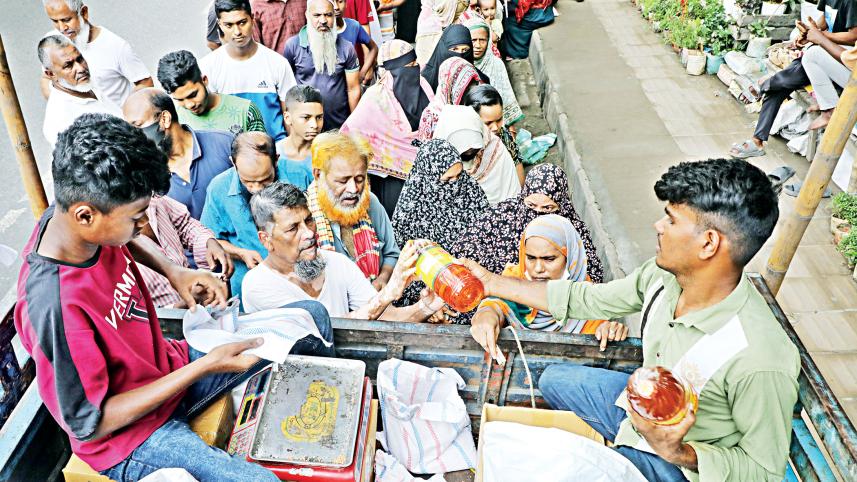With TCB sales halted, the poor left in limbo

Sales of essential food items from trucks have been suspended since the second week of September, while another subsidised food programme for one crore families is facing difficulties with an incomplete list of beneficiaries.
This comes as more people slip below the poverty line and many struggle to put three meals a day on the table.
Although officials say it is not feasible to keep selling subsidised food from open trucks year-round, economists said high inflation and falling purchasing power are threatening food security for a large section of the population.
The mobile truck sales scheme is run by the state-owned Trading Corporation of Bangladesh (TCB). Under this programme, TCB sends out trucks loaded with essential goods at subsidised rates for low-income people.
In 2022, TCB shifted its focus from truck sales to distributing food at affordable prices to one crore families through special cards. But allegations of irregularities and politically influenced selection of beneficiaries marred the programme. After the political changeover in August last year, the interim government began reviewing the list of recipients, which is still incomplete.
Apart from the card scheme, TCB continued limited truck sales during Ramadan or when prices became too high for the poor to bear. The most recent round ended on September 13 after running for a month.
TCB Chairman Brigadier General Mohammad Foyshol Azad said the next phase of truck sales would resume in November due to continued public demand and high market prices.
During the latest rounds of sales, long queues of poor people behind the trucks became a familiar sight. In Dhaka alone, essential items were sold through 60 trucks, helping low-income families cope with the soaring cost of living.
According to TCB, each truck carried goods for 500 people. From these trucks, a buyer can purchase 2 kg of lentils, 2 litres of soybean oil and 1 kg of sugar for Tk 450. The same items cost Tk 620-650 in the regular market.
For truck sales, the government allocated Tk 1,181 crore in subsidies to TCB in the fiscal year 2022-23. As the programme expanded nationwide, the subsidy rose to nearly Tk 3,500 crore last fiscal year.
Brig Gen Azad said the subsidy burden had eased slightly because purchasing prices were lower. "However, as the government needs to balance funding across many issues, a continuous truck sales programme is not feasible," he said, citing subsidy constraints.
According to a recent report by policy think tank Power and Participation Research Centre, poverty in Bangladesh has risen over the past three years. Nearly 28 percent of the population now lives in poverty, up from 18.7 percent in 2022.
The share of people living in extreme poverty has also risen to 9.35 percent this year from 5.6 percent three years ago, the report said. Another survey by the same organisation found that about 70 percent of the population is worried about rising prices.
On a positive note, inflation has been easing in recent months. It stood at 8.29 percent in August, down from 8.55 percent in July, according to the Bangladesh Bureau of Statistics. August inflation was the lowest in more than three years.
After the interim government took office in August last year, about 43 lakh TCB family cards were cancelled due to irregularities.
Brig Gen Azad said more than 65 lakh TCB cards have now been distributed. Of these, about 3.5 lakh are awaiting activation. Additional cards are also ready for activation, taking the overall total to 70 lakh.
"We hope that 63 to 64 lakh cards will be activated by October," he said, adding that data entry and verification are underway. To speed up activation, TCB has launched a self-activation app.
Among the 30 lakh inactive or pending cards, around 22 lakh are in Dhaka and Chittagong divisions, said the TCB chairman.
He said the delay in city corporations is due mainly to the absence of elected mayors and representatives, which slows down endorsement and identification.
TCB also has limited manpower, with only 14 offices across the country, making it impossible to directly select or verify all one crore beneficiaries.
"We expect the remaining 30 lakh cards to be distributed within the next three months. But we also need to understand that district officials have multiple responsibilities," he said.
Brig Gen Azad added that there is now a focus on impartial selection of beneficiaries, free from political influence, which is causing delays but is essential for fairness.
Alongside the usual essentials like oil, lentils and sugar, cardholders will soon be able to buy five more items, such as salt, bathing soap, laundry soap, detergent and tea.
This pilot project will primarily cover 5 lakh people across 10 districts, with plans to expand nationwide if successful.
Selim Raihan, a professor of economics at Dhaka University, said the suspension of truck sales amid incomplete card distribution and high food prices reflects a serious lack of foresight and coordination.
"It undermines the very purpose of the government's relief efforts and raises questions about the priorities behind such a decision," said the economist.
"The government should immediately resume the TCB truck sales programme to provide urgent support to the struggling population and expedite the beneficiary selection process to ensure that assistance reaches those who need it most without further delay," he added.




 For all latest news, follow The Daily Star's Google News channel.
For all latest news, follow The Daily Star's Google News channel.
Comments